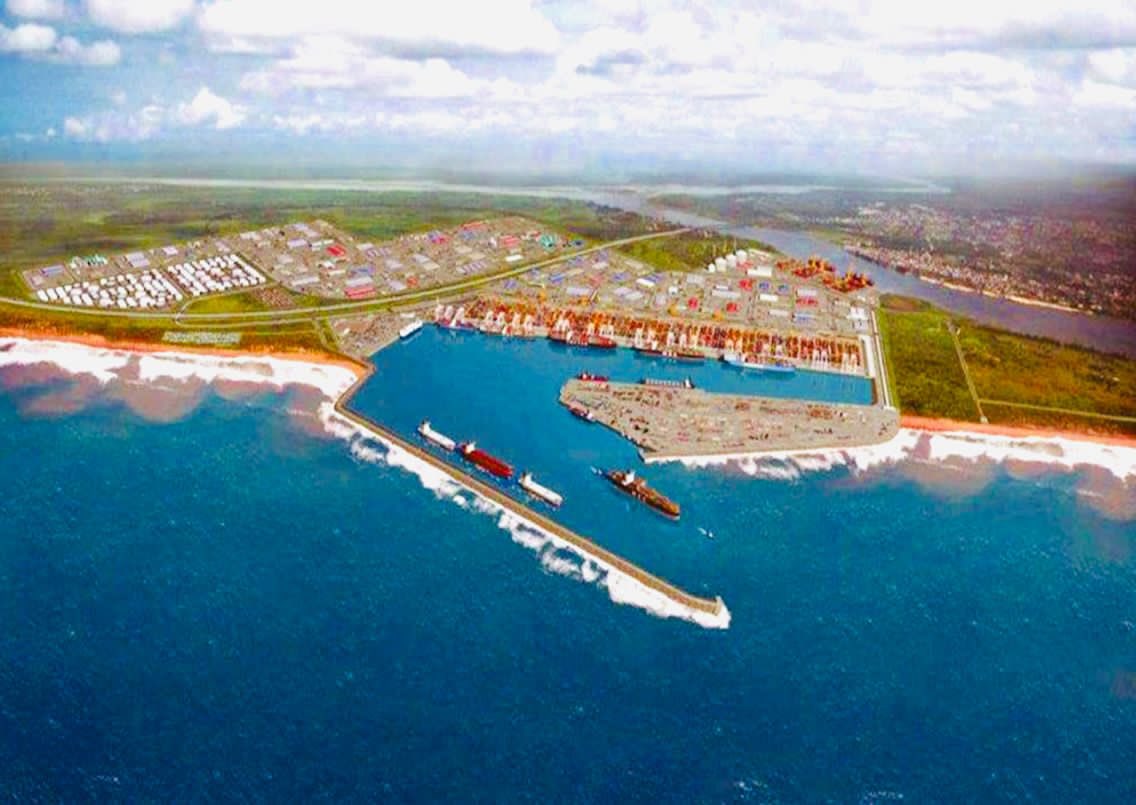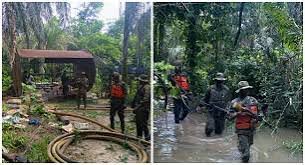
Even though the Lagos state Governor; Babajide Sawo-Olu had raised hopes about its imminent take-off, stakeholders in the maritime industry have expressed divergent views on the development of the Badagry Deep Sea Port in the state.
While some argue that it will enhance Nigeria’s maritime potential and boost regional trade opportunities, others opined that the development of the Badagry Deep Seaport is a waste of resources. They maintained that these resources should instead be used to develop river ports in the state and the nation at large.
Recall that Nigeria’s first deep sea port; the Lekki Deep Sea Port, was commissioned by former President Muhammadu Buhari in January 2023. The $1.6 billion project has started operations and is expected to become a major cargo hub for West Africa.
Similarly, the Federal Government approved $2.59 billion for the development of the Badagry Deep Seaport project in August 2022.
And according to Governor Sanwo-Olu, the project will generate 250,000 direct jobs, enhance government revenue, and operate under a Build Operate and Transfer (BOT) concession agreement.
However, speaking with Shipping Position Daily last week, the immediate past President of the Shippers Association of Lagos State (SALS), Reverend Jonathan Nicole, noted that creating additional deep-sea ports does not guarantee cargo. He stated that with the creation of the Lekki deep-sea port and Badagry deep-sea port, either of the two will suffer due to a lack of cargo.
Nicole specifically noted that if Lekki deep-sea port is used as a transhipment port, the cargo there will be substantial, and some service boats will move from Lekki to Apapa and Tin Can ports. However, containers will only be moved to Cotonou in Benin Republic, based on the importers’ demand.
Speaking further, Nicole noted that the creation of multiple deep-sea ports such as Badagry, Ondo, Ibom, and others are all white elephant projects that might not last in the long run, due to the harsh economy.
He explained that: “When a system has collapsed, it becomes free for all. These issues originated from the old administration. When they started developing ports, some of them were not even viable. Some ports have been there for ages and haven’t been used. So, creating a deep-sea port does not guarantee cargo. What’s the point of creating those ports when we doubt if they have the necessary facilities? They are creating ports and also making importation very difficult.
“Yes, we have the Lekki Deep Seaport, which was created in Lagos as an alternative to the congestion in Apapa and Tin Can. But we can divert it to Badagry port, which is way off Lagos. So, we believe that either Lekki or Badagry port will suffer due to a lack of cargo. Don’t forget, we have transhipment ports. If Lekki Deep Seaport is used as a transhipment port, it means the cargo there will be huge, and some service boats will move from Lekki to Apapa and Tin Can. But there are some vehicles that will be used to move some containers to Cotonou based on the importer’s demand.
“Some of those deep-sea ports in Ondo, Akwa Ibom, and others are all white elephant projects and over time, with this harsh economy, shippers might not even bring in cargo anymore, and the ports will remain fallow and unused. Of course, nature has a way of refreshing itself. The deep-sea port will eventually be covered with sand, and they might not be useful anymore, wasting the investment,” Nicole noted.
Also speaking, the immediate past Vice President of the Manufacturers Association of Nigeria (MAN), Chief John Aluya, opined that the duplication of deep-sea ports in Lagos is not in the nation’s best interest. He added that one deep-sea port is enough for the country, if well managed and utilized.
Aluya lamented that Togo has overtaken Nigeria in shipping, despite having only one deep-sea port. He further stressed that the resources the government is putting into Badagry port and others in the country will be a waste. He advised that those resources should be deployed to build an efficient deep-sea port with effective feeder vessels that move the cargo to various regions of the country.
“I am one of the advocates of the fact that one deep sea port is sufficient for this country if it is managed efficiently with feeder vessels. If we have effective feeder vessels that transport cargo from the deep-sea port to Apapa, Onne, Koko, and Calabar, then we don’t have a problem. We don’t need too many deep-sea ports”.
Arguing further, he said, “Togo has overtaken Nigeria in shipping. How many deep-sea ports do they have? Just one. They don’t have two or three. All we need is to effectively manage our deep-sea port”.
“The resources we are putting into Badagry, not only that, even in Akwa Ibom, are just wastage of resources,” he said.
On the contrary, the Chief Executive Officer of the Center for the Promotion of Private Enterprise (CPPE), Dr Muda Yusuf, noted that Nigeria, a country with immense maritime potential, will explore the possibility of becoming a maritime hub for the African sub-region through the development of the Badagry Deep seaport.
Yusuf noted that if the proposed new deep-sea port operates efficiently, it could attract transit cargo heading to landlocked countries like Mali and Burkina Faso, thereby providing an alternative to the existing options of Benin Republic and Togo.
He stressed that a higher number of ports could lead to increased competition, potentially resulting in reduced freight costs and improved services. According to him, this is crucial in light of challenges and inefficiency issues faced in existing ports in Lagos (Apapa and Tin Can).
He stressed that the private sector would play a crucial role in realizing this vision, as neither the Lagos state government nor the Federal government is expected to fund the construction.
Muda further highlighted that before the private investor considered undertaking the Badagry Deep seaport project, rigorous feasibility studies must have been conducted.















